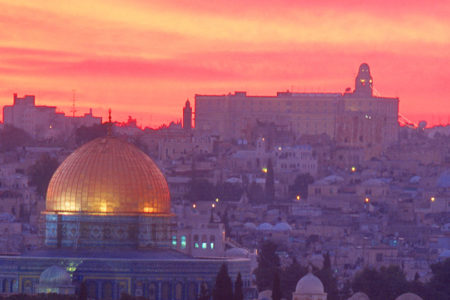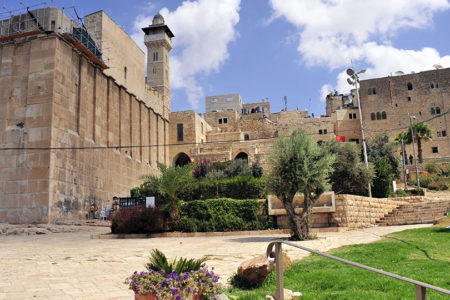Living With the Peace Process
On September 13, 1993, Israel signed a peace treaty with the PLO, an organization then known as one of our worst enemies. You would expect that after such an historic step, things would become calmer and more peaceful, but the truth is that there have been more terrorist attacks in the period of time since the signing of the treaty than during the same length of time prior to the signing. This was, in fact, what our leaders expected, and we are told that this is the price we must pay for peace in the area.
One reason for the increased terrorist activity is that Israel signed the treaty with the PLO only. The PLO, however, is not the only organization representing the Arabs in the Gaza Strip and Jericho. Other groups, like the radical Hamas, have sworn openly to continue to fight Israel until the state is destroyed. Thus, to demonstrate their power and influence, they have increased their attacks. In response, the PLO must keep peace within the territories assigned to them. If they cannot do so, Arafat risks being judged incompetent, and his hopes for the future will be in jeopardy.
Yasser Arafat must demonstrate, through his administration of the autonomous territories, that it is in Israel’s best interest to give him more land to control. But while the Chairman has his hands full keeping the peace within Gaza and Jericho, the other Palestinian areas are giving Israel a lot of trouble. The sad fact is that the PLO has much to gain if the Intifada continues in areas not yet under his control. If Arafat can stabilize Gaza and Jericho, Israel will be under significant pressure to grant the PLO the opportunity to do the same in other parts of the West Bank. A good example of this possibility is Hebron. The Intifada continues there, and rumor has it that some in the government would like to relinquish control of the town completely. Many worry that if this happens in Hebron, Jerusalem may be next. We hope not.
We Israelis feel it is important for our friends abroad to understand the meaning of peace in the Middle East. It will never be the same as it was, for example, for East and West Germany—family reunions, the end of borders, and economic and national unification. This is not the way it will be.
You see, Israel and the Muslim nations have always been at odds with one another. Therefore, the best we can hope for is the ability to coexist without bloodshed and contention.
We believe we are now witnessing the first steps toward a Palestinian state. They have their own police, passports, stamps, and flag. Although our leaders continue to declare their opposition to such a state, it appears they may be conceding the possibility.
At this time, Israelis have no desire to visit Gaza or Jericho. Even with Palestinian police officers in the area, Israelis still do not feel safe to enter the autonomous regions. Our sense is that it will take some time for Jews to be comfortable in areas controlled by the Palestinians. Contributing to our discomfort was the statement made by Mr. Arafat in Johannesburg, South Africa (“Join me,” he exhorted Muslims, “in a ‘Jihad’ against Israel until Jerusalem is free!”). It doesn’t appear that he has the best intentions toward his new Israeli neighbors!
Those who were opposed to portions of the government’s position at the start of the peace process are still worried. Their concern is compounded by the fact that the opposition parties have not presented better alternatives. Some even feel the government has decided to sacrifice any piece of territory demanded by our adversaries in exchange for a chance at peace.
People keep hearing the words, “Gaza and Jericho First.” The significance is, of course, that they will soon be demanding much, much more.
For many, the street-level reality of the peace process has been disappointing. Despite all the talks, it seems little has really changed in our daily lives or the political situation, apart from the shrinking of our land. The conventional Arab attitude toward Israel is just as it was before—very bad.
Personally, because we are in the middle of a process, we realize that the changes will be slow in coming, and we cannot therefore give any accurate prediction of the outcome. We are so caught up in the activities of our busy lives that we have little time to analyze daily developments. In this sense, life for most Israelis is as normal as ever. The only protests we hear these days are from the settlers living on the disputed borders.
There is one other problem worth mentioning: the release of Palestinian prisoners from Israeli prisons. According to the Cairo agreement, Israel has agreed to release 5,000 under the condition that each sign a document stating that they will refrain from terrorist activities against Israel. A few of the prisoners refused to sign and remain in prison. A legitimate cause for concern is that among those released are convicted murderers who are now free to become officers in the Palestinian police force. It is little wonder that Israelis are frustrated and even furious that, while these men are free, our own prisoners of war are still in captivity.
Several challenges have opened for our ministry as a result of the peace process. The peace process has not brought about a change in the limitations on our ability to work among Arabs. Since the start of the Intifada six years ago, Arabs friendly with Israelis have been considered traitors by their people. As a result, fraternizing with Jews can cost them their lives. One may object by saying, “But you are Christians.” While this is true, we are still Israeli citizens and, as such, will remain enemies in the eyes of people who can do our Arab brothers much harm. Perhaps not enough time has passed, yet it is difficult to accept this situation when our hearts are overflowing with love and concern for these people whom we would love to reach with the gospel.
In the Jewish sector, the issue has raised questions about real peace and how to bring it about. This has given us opportunities to point out the religious problems between Muslims and Jews and the true solution that can come only by knowing God.
As Christians, we know that Israel may enjoy a period of relative peace, but we also know that such a peace will be temporary and false. The common Israelis are weary with war and seem eager to grasp any opportunity for lasting peace. This puts us—Christians who talk about a false and temporary peace—in an unpopular position. Those who think only of today find it hard to accept the fact that true peace will come only with the Messiah. Please pray that the Lord will give us wisdom and patience as we try to work through the many obstacles facing us and demonstrate the love of the Messiah to Jews and Arabs alike here in His land.







